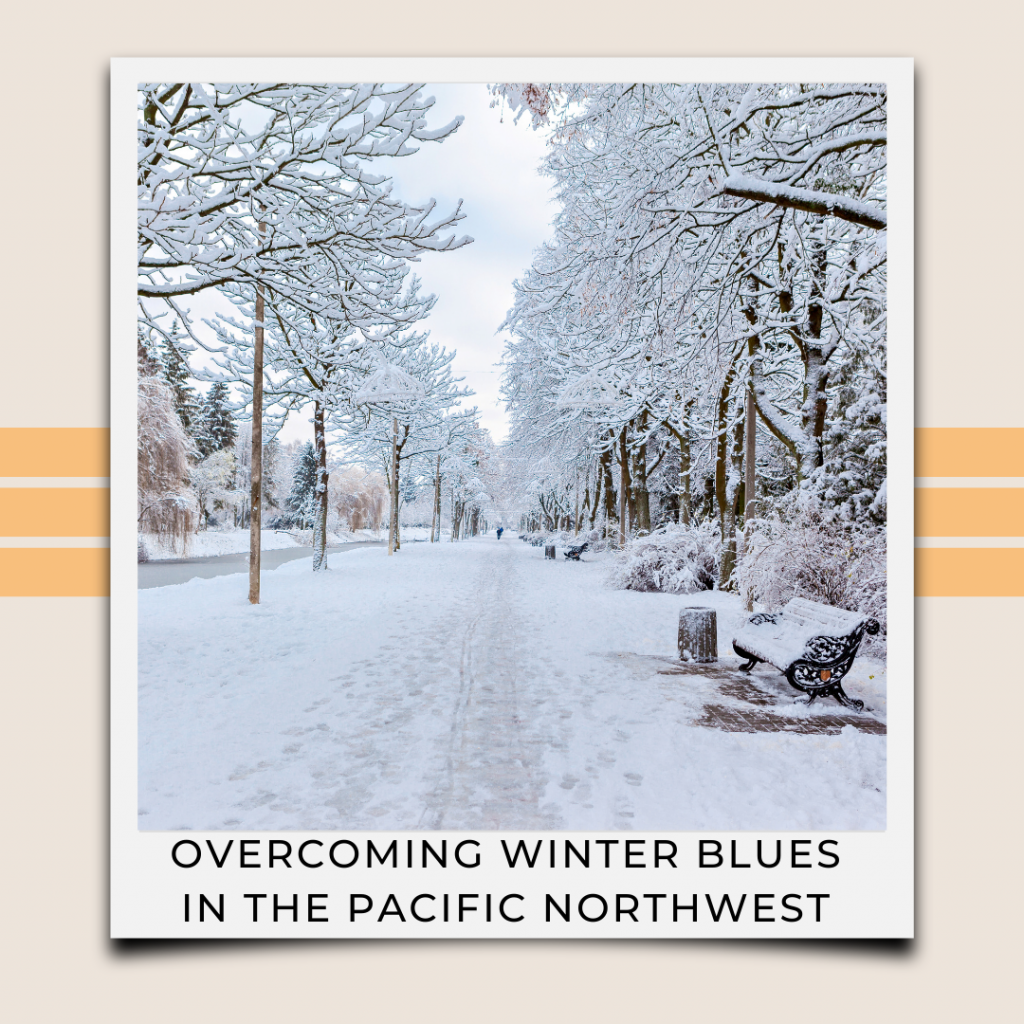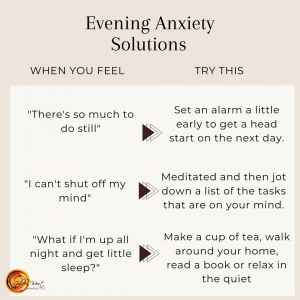It’s no surprise when mid October rolls around, we begin to mentally prepare for another Pacific Northwest winter. Then the holidays give an added bonus of complexity. According to a study published by the National Alliance on Mental Illness (NAMI), 64% of people with a mental health diagnosis report the holidays exacerbate their symptoms.
What causes winter blues?
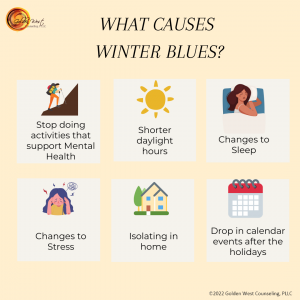 Many people experience an uptick of anxiety or depression (or both!) during the winter months. In the winter, we tend to isolate ourselves in our homes and after the lockdown from the pandemic, for some of us this can give the illusion of comfort. While being at home is warm and cozy, this switch often causes people to stop doing activities that support their mental health. The colder weather may lead you to give up your daily walk or run, and your calendar may be sparse after a full holiday schedule.
Many people experience an uptick of anxiety or depression (or both!) during the winter months. In the winter, we tend to isolate ourselves in our homes and after the lockdown from the pandemic, for some of us this can give the illusion of comfort. While being at home is warm and cozy, this switch often causes people to stop doing activities that support their mental health. The colder weather may lead you to give up your daily walk or run, and your calendar may be sparse after a full holiday schedule.
The shorter days also contribute to feelings of depression. Our circadian rhythms can be disrupted with a few hours of daylight and an increased dependency on artificial indoor light. Our circadian rhythms impact the release of hormones into our bodies and when disturbed, can lead to an imbalance in key hormones, including hormones related to sleep and stress.
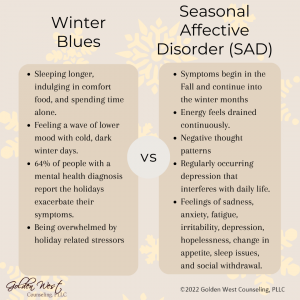 Can someone who does not normally struggle with depression be depressed during the winter only?
Can someone who does not normally struggle with depression be depressed during the winter only?
Yes. This can be related to Seasonal Affective Disorder where symptoms have a seasonal pattern, but not always. The holiday season comes with its own expectations and set of stressors, both external and internal. Being overwhelmed by holiday related stressors can lead to symptoms of depression.
Things you can do to beat winter blues
If you find yourself feeling down this winter, there are several things you can do to support your mental health and boost your mood.
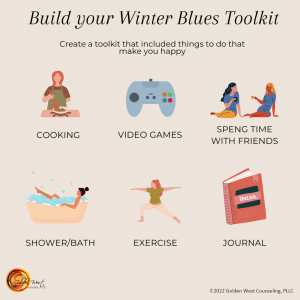
Build a toolkit: This is going to be your guide for coping through the winter blues. Take time to think about things to do that make you happy. Maybe it’s trying a new cooking recipe, having a movie marathon, playing a board game with friends, or playing your favorite video games. Write down a list of the activities you enjoy on your phone. Include small tasks like taking a shower or calling a friend. When our mental health is struggling, we can also struggle to think of the items that bring us joy, so having pre pre-created list will be helpful when these moments happen. When it’s needed it will always be with you!
Create a new routine: Create a routine that helps you enjoy things despite the early darkness. Read a book, start a craft project, play board games, online video games
Limit external sources of holiday pressure: Consider taking a break from social media if you’re seeing other people post holiday photos and are causing you to engage in self comparison or ruminative thoughts. Find winter activities to enjoy, solo or with others, like snowshoeing. MeetUp is a great app to find activities to do with others.
Light Therapy: One of the most common treatments for beating winter blues is light therapy. Sun lamps, happy lights, or dawn simulators all provide the light that can stimulate cells in the retina and regulate circadian rhythms and ease symptoms. This involves sitting by a light for about a half hour. Light boxes can easily be found at TARGET, BED BATH AND BEYOND OR AMAZON.
Get outside: When the sun is shining, try to get out and take advantage of it! You may need to bundle up, yet gearing up in some layers is worth it for your mental health. Consider taking your lunch break during the warmest part of your work day and going for a walk.
Prioritize sleep: Sleep is key to keeping you well, both mentally and physically. Make sleep a priority by creating a nightly sleep hygiene routine and get at least 7 hours of sleep a night, while minimizing electronic use.
Supplement: Many people are deficient in Vitamin D, especially during the winter months. Meet with your doctor to know the right amount of Vitamin D your body needs.
Practice Wellness and Reflection: Try to be present in your days, both the good and bad days. It’s OK to not be OK, and placing pressure on yourself only increases symptoms. Consider taking a PTO day from work. Reflecting through journaling can also help you to work through negative thought patterns. Give yourself 20 minutes maximum to write a reflective journal about your thoughts.
Incorporate movement into your daily routine: Whether it’s laying up and going for a walk outside, practicing yoga in your home, or joining a group workout class, body movement releases endorphins, causing you to be in the present moment, and decreasing stress.
Keep a Journal: Writing down your thoughts is great for your mental health in general. This tool can become even more critical when you’re feeling especially blue. Journaling has been proven to provide relief from anxiety and stress, it can also be a great opportunity to redirect your mind in a positive direction. When journaling, keep it to no more than 20 minutes (5 minutes is powerful too!). This will decrease the chance of reaching rumination.
Allow yourself to rest: When the holidays can feel like non-stop activities, it’s even more critical to prioritize time to relax and rejuvenate.
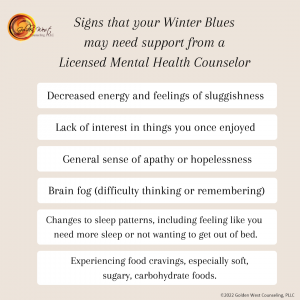
When to get help from a professional
Sometimes winter blues may not be winter blues, but rather Major Depressive Disorder, Generalized Anxiety Disorder, Seasonal Affective Disorder, or something entirely different.
Signs that mean speaking with a Licensed Mental Health Counselor maybe needed:
● Decreased energy and feeling of sluggishness
● Lack of interest in things you once enjoyed
● General sense of apathy or hopelessness
● Brain fog (difficulty thinking or remembering)
● Changes to sleep patterns, including feeling like you need more sleep or not wanting to get out of bed.
● Experiencing food cravings, especially for soft, sugary, carbohydrate foods
● Weight gain
Winter can present a number of challenges. When it comes to stress and mental health matters, there tends to be a tendency to “wait it out and see how it goes,” but if you’re feeling anxious and/or depressed don’t delay feeling better.
Call us today and schedule your complimentary consultation.

